For your viewing pleasure!
These films will screen Wednesday nights at the Portage Theater on 4050 N. Milwaukee Ave. Doors open at 7 PM and shows start at 7:30 Admission is $5
February 16th, 2011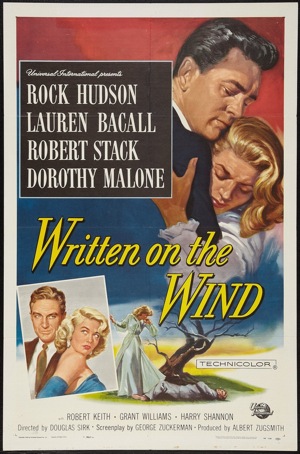
WRITTEN ON THE WIND
Douglas Sirk • 1956
Perhaps the most anxious and lurid of Sirk’s incredible run of melodramas for Universal-International, Written on the Wind is a soap opera laid in a Texas too extravagant for even Edna Ferber. Everything is out-sized but developmentally crippled—big, big oil derricks, shotgun aeroplane weddings, saloon brawls, and a hoochie-cooch pagan jazz dance that embarrasses Old Testament fury. Even a child’s bucking bronco becomes as a crude-cruel reminder of vanished potency. Robert Stack and Dorothy Malone star as those danged spoiled rich thirtysomething Hadley brats with a Texas-sized deficit of self-awareness and restraint. (The latter won a much-deserved Oscar, in a mind-boggling moment of slumming for Academy voters.) Rock Hudson, at his most heterosexual, plays long-time Hadley hanger-on Mitch Wayne, born with sense and decency rather than a trust fund. Lauren Bacall is a tragic witness to the unraveling. (KW)
99 min. • Universal International Pictures • 35mm from Universal
Shorts: Saga of the First and Last (Margaret Conneely, 1954, 4 min) and Newsreel – 1956
Notes on Saga of the First and Last: Margaret Conneely was active in amateur filmmaking locally and internationally for nearly half a century, first joining a local Chicago camera club in 1949. She shot and directed 16mm films at a time when most of the women in these clubs were less technically inclined and often delegated to the role of actress or slide show manager. Margaret often used her kids as the principal actors. Her son, John, stars in Saga of the First and Last, a short film about a boy, a gun and his first cigarette. This film was preserved to 35mm by the City of Chicago for the outdoors Grant Park Film Festival in 2006. For more information about the Margaret Conneely film collection at Chicago Film Archives, please visit their website. [Please Note: Due to audio inconsistencies in the original 16mm mag track, the sound is uneven at times.]
February 23rd, 2011
I MARRIED A WITCH
Rene Clair • 1942
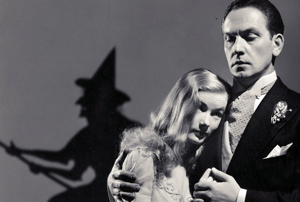 Joel McCrea was originally slated to star alongside Veronica Lake in this precursor to the 60s TV series Bewitched, but refused to work with the blond bombshell following their testy relationship during the production of Sullivan’s Travels (producer Preston Sturges didn’t get along with her either, nearly strangling the young actress when he found out she was six months pregnant at the start of the film). Before Lake and her father (Cecil Kellaway) are burned at the stake by Seventeenth Century Puritan Jonathan Wooley, they put a curse on all of Wooley’s male descendants ensuring misery in marrage. Little did they know that way the heck off in the twentieth century, the young witch would fall madly in love with Wooley’s 1942 incarnation (Fredric March) on the eve of his marriage to Susan Hayward, who spends most of the movie nagging March about his political career. Paramount didn’t quite know what to do with a film that solved familial squabbling by trapping loved ones in wine bottles and sold the movie to United Artists. A shame, as this ranks among the best of Sturges output for the studio (look for a good half dozen of his stock character actors) and Clair’s output in America, and Lake could sweep any young man over thirteen off of his wobbling knees (though Jonathan Rosenbaum writes of having a similar experience watching the film at age six). Crazy Ray, Clair’s early science fiction film, precedes the film and will be accompanied by Jay Warren on the Organ. (JA)
Joel McCrea was originally slated to star alongside Veronica Lake in this precursor to the 60s TV series Bewitched, but refused to work with the blond bombshell following their testy relationship during the production of Sullivan’s Travels (producer Preston Sturges didn’t get along with her either, nearly strangling the young actress when he found out she was six months pregnant at the start of the film). Before Lake and her father (Cecil Kellaway) are burned at the stake by Seventeenth Century Puritan Jonathan Wooley, they put a curse on all of Wooley’s male descendants ensuring misery in marrage. Little did they know that way the heck off in the twentieth century, the young witch would fall madly in love with Wooley’s 1942 incarnation (Fredric March) on the eve of his marriage to Susan Hayward, who spends most of the movie nagging March about his political career. Paramount didn’t quite know what to do with a film that solved familial squabbling by trapping loved ones in wine bottles and sold the movie to United Artists. A shame, as this ranks among the best of Sturges output for the studio (look for a good half dozen of his stock character actors) and Clair’s output in America, and Lake could sweep any young man over thirteen off of his wobbling knees (though Jonathan Rosenbaum writes of having a similar experience watching the film at age six). Crazy Ray, Clair’s early science fiction film, precedes the film and will be accompanied by Jay Warren on the Organ. (JA)
77 min. • Rene Clair Productions • 16mm rescued from the Bank of America Cinema Booth, courtesy of Mike King.
Medium: Crazy Ray (Paris Qui Dort) (Rene Clair, 1925, 35 min) 16mm
Notes on Crazy Ray: A young night watchman at the Eiffel Tower awakes at 3:25 in the morning to find that all of Paris is frozen in time. Considered one of the most formative science fiction films, Rene Clair edited his second film down to a brisk 35 minutes in the 50s. Live organ accompaniment by Jay Warren!
Print Courtesy of the Chicago Film Archives, from the Chicago Public Library Collection
March 2nd, 2011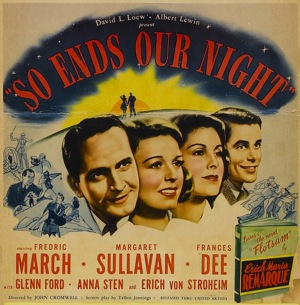
SO ENDS OUR NIGHT
John Cromwell • 1944
Our memories of wartime Hollywood pictures are generally limited to patriotic army propaganda and topical espionage thrillers—familiar genre dynamics essentially retrofitted with political import. But an unexpected and radical strain of melodrama co-existed with these assembly-line exercises. Despite generally isolationist views dominating the American scene before Pearl Harbor, Hollywood turned out a handful of films declaiming the carnage as a particularly human tragedy. Familiar stars played the dispossessed and unwashed masses of Europe, but the plots dripped with intimations of genocide that respectable newspapers declined to print. So Ends Our Night is a particularly neglected example. Despite an outstanding pedigree (reliable craftsman John Cromwell in the director’s chair, production design by the inimitable William Cameron Menzies, a source novel by Erich Maria Remarque, sophisticate Albert Lewin overseeing production), this United Artists release was soon traveling around in dupey prints from the disingenuously named Favorite Films Corporation and forthwith to the public domain wilderness. Fredric March, Margaret Sullavan, and Glenn Ford are a trio of refugees (the first a conscientious objector to the Nazi regime, the latter two explicitly Jewish) whose warm friendship and life-affirming solidarity is tested by the relentless violence and hopelessness of European society. Erich von Stroheim, whose screen persona was cemented early on with infinitely hissable portrayals of German officers during the Great War, comes full circle with a memorable performance as a Nazi thug. Also featuring Francis Dee, Sig Rumann, and Anna Sten. (KW)
117 min. • David L. Loew-Albert Lewin • 16mm from Radio Cinema Film Archive
Short: The Shell Shocked Egg (Robert McKimson, 1948, 7 min) 35mm Technicolor
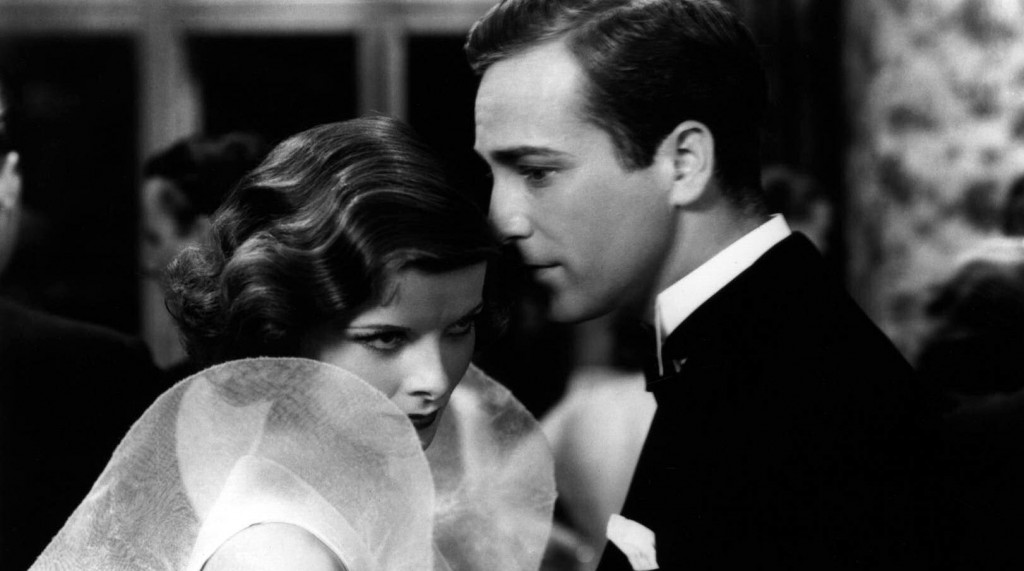 March 9th, 2011
March 9th, 2011
A BILL OF DIVORCEMENT
George Cukor • 1932
“In those few simple feet of film a new star was born.” So said David O. Selznick after watching an audience react to their first glimpse of Katharine Hepburn, playing a young woman whose shell-shocked father (John Barrymore) escapes from a mental institution and comes home on the day his wife (Billie Burke) is set to marry another man. Clemence Dane’s play had been milking tears from audiences since its 1921 debut, and in this second filming, the tears kept coming as the fresh-faced newcomer and The Great Profile breathed new life into the drawing-room melodrama. The studio was so convinced by the critical and popular approval of their new starlet that they were willing to put up with her offscreen eccentricities and give her a contract. We can only assume it guaranteed that they’d spell her name correctly in the credits for future films. (MP)
70 min • RKO • 16mm from Radio Cinema Film Archive
Short: Unaccustomed as We Are (Hal Roach, 1929, 21 min) Rare Sound Version on 16mm
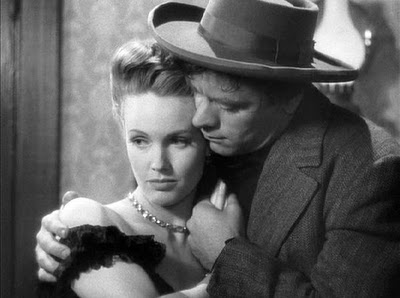 March 16th, 2011
March 16th, 2011
I SHOT JESSE JAMES
Samuel Fuller • 1949
The sensational story of a man who lived, loved and died by the gun! Sam Fuller’s first film as a director, and one his three films at Lippert Pictures (The Baron of Arizona and The Steel Helmet followed, gems amongst dozens of quickly produced B pictures made for Robert Lippert’s theater chain) I Shot Jesse James anticipates the darker stylistic elements of Anthony Mann’s westerns, but with sentiment closer to something like I Am A Fugitive From A Chain Gang (see the film’s last few shots), predicting the surface textures of Mann’s western noirs with a pre-code heart. Fuller – and John Ireland as the coward Robert Ford – make a tragic hero out of the most despised character of Western Lore; Ireland is clean shaven, meek, and when the light hits him right, he’s troublingly beautiful. In many ways Fuller’s sympathies towards Robert Ford shape the language for pretty much every revisionist western that followed. (JA)
81 min • Lippert Pictures • 16mm from Radio Cinema Film Archive
Short: The Lone Stranger and Porky (Robert Clampett, 1939, 7 min) 16mm
March 23rd, 2011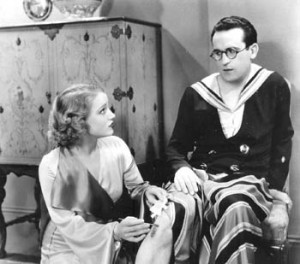
MOVIE CRAZY
Clyde Bruckman • 1932
After two earlier attempts to transition into sound, Harold Lloyd made what would prove to be his best “talkie.” Harold Hall is a small-town boy with silver-screen fantasies, but it is only by an accident that he makes it to a sound stage at Planet Studios. He meets Mary (Constance Cummings), an enigmatic actress with a strange desire to test Harold’s loyalty. The film successfully weaves the silent comedy technique of visual gags into a sound film. Harold’s screen test, a clever use of verbal humor, turns into a parody of the dramatic stars of early talkies. The film’s climax on a movie set, with an eerie lack of background music, is one of the many highlights. Though Clyde Bruckman is credited, Lloyd claims to have directed most of the picture himself. Determined this time to have a strong script, Lloyd secured the services of Broadway playwright Vincent Lawrence to write the screenplay. (MH)
81 min • Harold Lloyd Corp. • 35mm from the Harold Lloyd Estate
Short: Battle of the Century (Clyde Bruckman, 1927, 15 min) Rare restored print on 16mm
March 30th, 2011 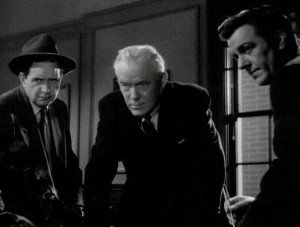
RAILROADED!
Anthony Mann • 1947
Even the most dedicated among us sometimes confuses Anthony Mann’s forties output—so many films, so many generic characters and set-ups, so many double-crosses elaborate and elaborately similar. But each is also imbued with a real pugilist desire to bust out of the Poverty Row rat trap (or hornet’s nest?). Whether it’s Eagle-Lion or RKO or Republic (really, it doesn’t matter), a cry rises up from the sawmill floor—“Notice me! Acknowledge my efficiency and reward my small achievements!” And always from this whiny din, a moment of advanced sadism, an innovation to make the foreman howl with tentative, but mostly jealous, disapproval. Though Railroaded! doesn’t have a man carved up by tractor blades (vide Border Incident), it does feature John Ireland as Duke, the misogynistic thug who indiscriminately fires perfumed bullets. He and Jane Randolph frame pretty boy laundry truck driver Ed Kelly in the murder of a cop. But when the innocent man’s plucky sister gets involved—watch out! (KW)
72 min • PRC • 16mm from Private Collections
Short: Philo Vance, Detective (Screen Gems, 1947, 18 min) 16mm
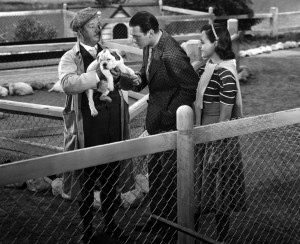 April 6th, 2011
April 6th, 2011
THE YOUNG IN HEART
Richard Wallace • 1938
In an effort to get into the will of an elderly woman they recently rescued from a train wreck, the Carletons – a nuclear family of con artists including Janet Gaynor, Douglas Fairbanks, Jr., Roland Young, and a very witless Billie Burke – get working class jobs in order to prove that they are earnest and wholesome people. Fairbanks becomes a mail clerk for Paulette Godard (this would be the first time the star of Modern Times spoke in a credited role) and Roland Young becomes a car salesman of the Flying Wombat. So sweet and gentle that it could hardly be called a screwball comedy, this Leslie Halliwell favorite by the little known Richard Wallace may be the best thing to come out of David O’Selznik’s production company, with enough substance to make up for the train wreck that is the second half of Gone With the Wind. (JA)
90 min • Selznick International Pictures • 16mm from Radio Cinema Film Archive
Shorts: The Incredible Stanger (Jacques Tourneur, 1942, 11 min) 16mm
At the Dog Show (1942, 7 min) 16mm Print Courtesy of the Chicago Film Archives
April 13th, 2011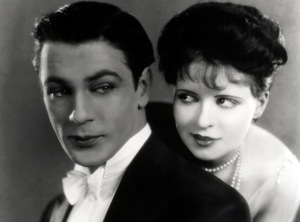
CHILDREN OF DIVORCE
Frank Lloyd & Josef Von Sternberg • 1927
Paramount production values are in full flower in this rarely screened Parisian melodrama. Clara Bow, Gary Cooper, and Esther Ralston are childhood chums going back to the convent days when their parents briefly orphaned them to accommodate a divorce. They grow up as frivolous, sensual spirits who know no sin except divorce. Cooper loves Ralston but marries Bow after a drunken debauch–can the matronly Hedda Hopper keep daughter Clara from repeating her mistakes? This famously troubled Frank Lloyd production was patched up and partially reshot by Josef von Sternberg, whose astonishing and delicate eight-year career at Paramount begins here. Die-hard auteurists will have fun identifying JvS’s scenes. Live Organ accompaniment by Jay Warren. (KW)
70 min • Famous Players – Lasky Corporation • 35mm from Library of Congress
Short: His Marriage Wow (Harry Edwards, 1925, 21 min) 16mm
April 20th, 2011
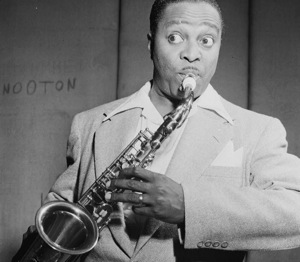 BEWARE
BEWARE
Bud Pollard • 1946
MGM may have had sultrier production values and an endless supply of moppets, but few musicals can lay claim to the effortless, straggling charm of Louis Jordan’s all-black, ultra-cheap Astor Pictures efforts–riffs in the best sense. Barely feature-length and accidentally plotted but overflowing with charm and verve, Beware was the first in the series. In this one, Louis plays bandleader Lucius Brokenshire Jordan, who returns to his alma mater, Ohio’s Ware College, to play a fundraiser with his band. Will he win back his college sweetheart Annabelle (now a gym teacher!) or lose her to the crummy oligarch who threatens the school’s solvency? If only Development personnel were this tuneful in real life … Numbers include Long Legged Lizzie, Land of the Buffalo Nickle, and Salt Pork, West Virginia. (KW)
54 min • Astor Pictures Corporation • 35mm from Library of Congress
Shorts: Katnip Kollege (Hardaway/Dalton, 1938, 7min) 16mm
Jammin’ The Blues (Gjon Mili, 1944, 10 min) 35mm
Trailer for Carmen Jones (Otto Preminger, 1954) 35mm Technicolor!
April 27th, 2011
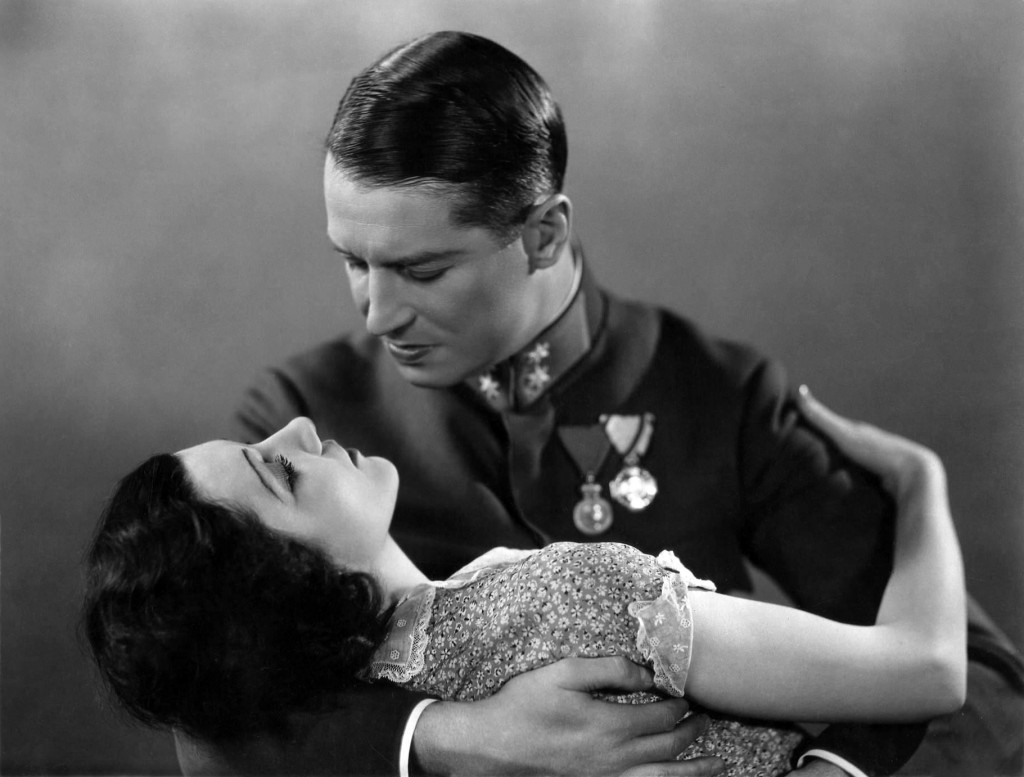 THE SMILING LIEUTENANT
THE SMILING LIEUTENANT
Ernst Lubitsch • 1931
It’s true love between comically French Maurice Chevalier (a Viennese lieutenant) and dewy Claudette Colbert (leader of the all-girl band at the local Biergarten) until Miriam Hopkins (a sheltered princess from the neighboring microstate) intercepts a single act of Chevalier’s irrepressible flirtatiousness and sparks off a series of international – and interpersonal – incidents. One of Lubitsch’s early musicals for Paramount (among the first Hollywood ever saw), The Smiling Lieutenant is a film that manages to simultaneously contain a number called “Jazz Up Your Lingerie” and (almost without realizing it) one of the most brutal, emotionally mature romantic endings Hollywood ever produced. (BH)
89 min • Paramount Pictures • 35mm from Universal
Short: Snow-White (Dave Fleischer, 1933, 7 min) 16mm
May 4th, 2011
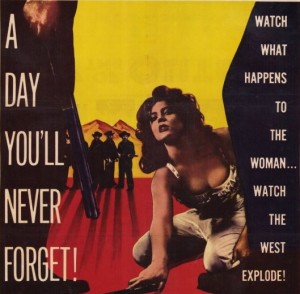 DAY OF THE OUTLAW
DAY OF THE OUTLAW
Andre De Toth • 1959
Please note that this film replaces SILVER LODE on our original calender. Burl Ives rides into a snowy, isolated town (yeah, just like in Rudolph the Red Nosed Reindeer, but he ain’t so jolly here) in the far West as the leader of a murderous renegade cavalry unit, threatening the lives of Robert Ryan and Tina Louise until they agree to lead him out of the town. While it’s claustrophobic tension and bouts of absurdist violence peg it as a quintessential western noir of the 1950s, the Monthly Film Bulletin in England rightly called Day of the Outlaw a western “in the best William S. Hart tradition,” too. It may be one of the bleakest films ever made, with wintry landscapes recalling Jacques Tourneur’s Nightfall and a messy sense of hopelessness that predicts Heaven’s Gate, the Western to end all Westerns. (JA)
96 min • Security Pictures • 16mm Widescreen from Private Collections
Shorts: Western Melodies (1949) and Howdy Doody: A Trip to Funland (1953) 16mm from Chicago Film Archives
Three Little Pups (Tex Avery, 1953) 35mm Technicolor from Radio Cinema Film Archive
May 11th, 2011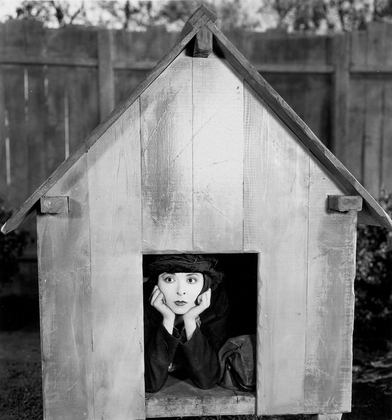
ELLA CINDERS
Alfred E. Green • 1926
Inspired by the syndicated comic strip by Bill Conselman (who wrote the screenplay for the Eddie Cantor film Whoopee! and Frank Borzage’s Young America), Ella Cinders stars Colleen Moore as a modern day Cinederella who escapes her rotten family to go to Hollywood, the land of promise and Harry Langdon. Chicagoans should recognize Moore’s name from her famous dollhouse now living at the Museum of Science and Industry, but sadly many of her films are unavailable to us as most of the 35mm materials were neglected after being sent from the Museum of Modern Art (where Moore herself had sent them to be preserved) to Warner Brothers. However, Ella Cinders still exists because of it’s non theatrical distribution on 16mm, and thanks to the work of private collectors and preservationists, we’re able to show it here. (JA)
60 min • John McCormick Productions/First National • 16mm from private collections
Shorts: Lulu in Hollywood (Izzi Sparber, Paramount, 1944)
others TBA!
May 18th, 2011
DISHONORED
Josef Von Sternberg • 1931
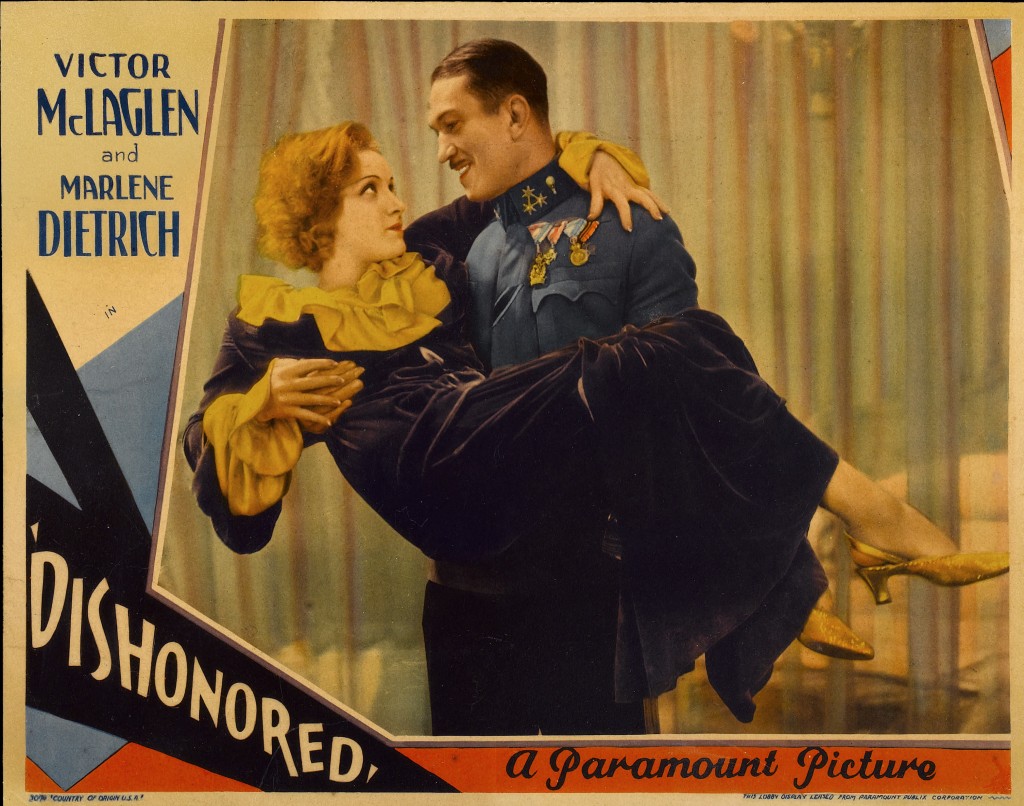 “What a charming evening we might have had, if you had not been a spy… and I a traitor.” Marlene Dietrich stars as smoldering secret agent X-27, an Austrian spy behind enemy lines (and between enemy sheets) in World War I. After the breakout success of Morocco, Paramount realized they had a Greta Garbo competitor on the lot, and designed Dishonored with an eye toward making Dietrich Hollywood’s preeminent ice queen, rushing it into production fast enough to beat Garbo’s previously announced, suspiciously similar Mata Hari by eight months. It may have been quickly made, but Josef von Sternberg’s take on the legendary courtesan retained his somnambulist pacing – in fact, there is no better film for luxuriating in von Sternberg’s peculiar haze. The non-sequitur dialogue, always issued discretely between pregnant pauses and often through lacey bric-a-brac, is made even stranger by Dietrich’s ESL line readings, still thick with phonetic uncertainty. As another of von Sternberg’s tragic military heroes rendered hapless by Dietrich, Victor McLaglen spends the whole movie growling through clenched teeth and a pained smile. What other reaction could there be? Cited by Jean-Luc Godard as one of the ten best American sound films, with good reason. (MK)
“What a charming evening we might have had, if you had not been a spy… and I a traitor.” Marlene Dietrich stars as smoldering secret agent X-27, an Austrian spy behind enemy lines (and between enemy sheets) in World War I. After the breakout success of Morocco, Paramount realized they had a Greta Garbo competitor on the lot, and designed Dishonored with an eye toward making Dietrich Hollywood’s preeminent ice queen, rushing it into production fast enough to beat Garbo’s previously announced, suspiciously similar Mata Hari by eight months. It may have been quickly made, but Josef von Sternberg’s take on the legendary courtesan retained his somnambulist pacing – in fact, there is no better film for luxuriating in von Sternberg’s peculiar haze. The non-sequitur dialogue, always issued discretely between pregnant pauses and often through lacey bric-a-brac, is made even stranger by Dietrich’s ESL line readings, still thick with phonetic uncertainty. As another of von Sternberg’s tragic military heroes rendered hapless by Dietrich, Victor McLaglen spends the whole movie growling through clenched teeth and a pained smile. What other reaction could there be? Cited by Jean-Luc Godard as one of the ten best American sound films, with good reason. (MK)
91 min • Paramount Pictures • 35mm from Universal
Short: Plane Daffy (Frank Tashlin, 1944, 7 min) 16mm
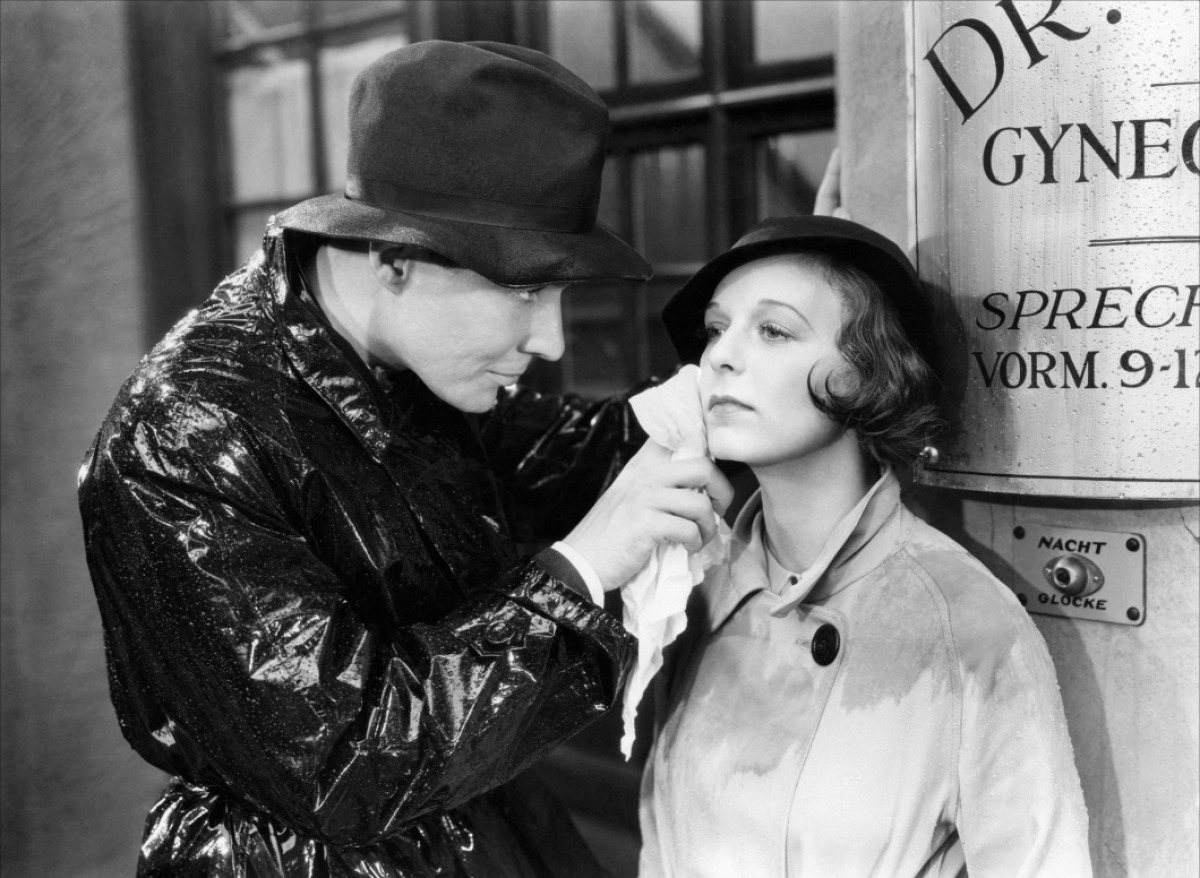 May 25th, 2011
May 25th, 2011
LITTLE MAN, WHAT NOW?
Frank Borzage • 1934
One of the best, most neglected films by one of Hollywood’s best, most neglected directors (you can’t even find a trailer for it on YouTube), Little Man, What Now? is a gently comedic drama based on a popular contemporary German novel. Margaret Sullavan and Douglass Montgomery radiate youth and sensuality as a couple struggling to make a good life for themselves in chaotic inter-war Germany. The fact that the Nazis banned (and eventually imprisoned) the author of the original novel after learning that the producer of Borzage’s adaptation was Jewish makes the film’s unrelenting hopefulness downright heartbreaking. (BH)
98 min • Universal Pictures • 35mm from Universal
Tick Tock Tuckered (Robert Clampett, 1944, 7 min) 16mm
Newsreel: 1934
Capsules by Julian Antos, Becca Hall, Matthew Hoffman, Mike King, Michael W. Phillips, Jr., and Kyle Westphal
Special thanks to Anne Wells at the Chicago Film Archives for help with the shorts program.
A BILL OF DIVORCEMENT and CHILDREN OF DIVORCE stills Courtesy of www.doctormacro.com
